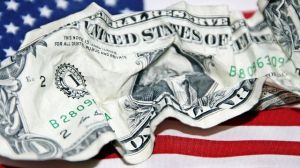With just four days to go until the 2014 midterms, here’s our final weekly roundup of news about this year’s money race.
Do you know where your polling place is, and what documents you’ll need to cast a ballot? If you have any questions, the nonpartisan League of Women Voters has answers at vote411.org. And if you encounter any problems at the polls, call the Election Protection hotline at 1-866-OUR-VOTE (1-866-687-8683) or visit their website.
Big Money: According to the Wesleyan Media Project, ad spending on congressional races has passed the $1 billion mark. Around 40 percent of it is dark money, with undisclosed donors. If you include spending on ads for ballot initiatives, judges and races for state offices, almost three million spots have aired during this election cycle at a cost of $1.67 billion.
The Times, They Are a Changin’: At Vox, Mark Schmitt, director of New America Foundation’s program on political reform, looks at three ways the 2014 midterms could permanently “transform money in politics.”
Republicans Still Dominate the Dark Money Game: Democratic-leaning donors like Tom Steyer have invested heavily in the 2014 race, but the Sunlight Foundation’s Peter Olsen-Phillips reports that when it comes to dark money, Republican-aligned groups have outspent their Democratic counterparts by around three-and-a-half to one.
Meet the Mega-Donors: Forty-two people have donated more than a third of what all Super PACs have spent this cycle. USA Today looks at who they are and where they’ve spent their money.
And at National Journal, Emma Roller and Stephanie Stamm introduce us to some of the Silicon Valley tech donors who are “dominating the midterms.”
Ghost Money: At The Center for Public Integrity, Michael Beckel reports that one out of every seven ads in this year’s hotly contested Kentucky US Senate race has been paid for by a group called The Kentucky Opportunity Coalition, which seems to exist onlt as a Post Office box located in a shopping center.
Speaking of Kentucky: Lee Fang reports for The Nation that Senate Minority Leader Mitch McConnell is bending every campaign finance rule on the books to defeat his Democratic challenger, Alison Lundergan Grimes.
FaceTime: At The Washington Post, Matea Gold reports that big donors are sending hefty checks to the Republican Governors’ Association in order to get “special access” to GOP governors in the hope that one of them will emerge as the party’s 2016 presidential nominee.
Texas Takes on Dark Money: This week, the Texas Ethics Commission adopted strong disclosure rules that would effectively stamp out dark money in state races. But David Saleh Rauf reports for the San Antonio Express-News that conservative lawmakers are furious, and there may be a hard fight ahead.
Justice for Sale: Mother Jones reporter Andy Kroll looks at the explosion of campaign spending in state and municipal judicial races — and how it is turning judges into politicians.
And here at BillMoyers.com, I compared our process with how the French select their jurists, and ran down some research confirming that campaign cash has an effect on how judges will rule.
Speaking of Judges: Robert Faturechi reports for ProPublica that a previously unheard of group popped up in Kansas just three weeks before the election with the goal of getting rid of two state Supreme Court justices. The group is engaged in electoral politics but doesn’t have to disclose donors because in Kansas’ transparency laws judges aren’t included as “state officers”.
Where’s the SEC?: A New York Times editorial notes that the Securities and Exchange Commission could require companies to tell shareholders about their political spending but so far, the agency has remained stubbornly on the sidelines.
Working the Refs: An investigation by Eric Lipton for The New York Times revealed that state “attorneys general are now the object of aggressive pursuit by lobbyists and lawyers who use campaign contributions, personal appeals at lavish corporate-sponsored conferences and other means to push them to drop investigations, change policies, negotiate favorable settlements or pressure federal regulators.



